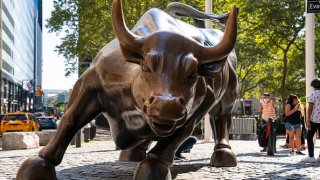
- In a research note Monday, the British lender suggested hedging remains warranted for investors given the swirling crowd of downside risks, but argued that the recent sharp reversal of the reflation trade was "overdone."
- In a note Tuesday, Citi analysts said a "last hurrah" value rally was likely as economies continue to reopen, particularly with Europe lagging the U.S.
LONDON — With Covid-19 cases on the rise due to the surging delta variant and a range of macroeconomic shifts occurring, the global market narrative has moved from "goldilocks to growth scare," according to Barclays.
In a research note Monday, the British lender suggested hedging remains warranted for investors given the swirling crowd of downside risks, but argued that the recent sharp reversal of the reflation trade was "overdone."
"The combination of data no longer delivering positive surprises, burgeoning evidence that supply and labour shortages could mean stickier inflation, China's increasingly determined crackdown on various industries, and increasing risk from the COVID delta variant have coincided with enough force to give markets a growth scare," said Emmanuel Cau, head of European equity strategy at Barclays.
Get Southern California news, weather forecasts and entertainment stories to your inbox. Sign up for NBC LA newsletters.
Cau highlighted that the prospect of lower growth and higher inflation is driving large and somewhat erratic moves in asset prices, with the recent dramatic fall in yields being the most obvious indicator.
"Equities so far have held up relatively well, but this belies large risk off rotation underneath the surface, which has largely washed out the positive returns from reflation trades," he said.
Money Report
What's more, poor summer liquidity and mixed messages from central banks is adding to market confusion and likely exacerbating the sharp moves, Cau added.
A 'choppy summer'
In recent weeks, the U.S. Federal Reserve has discussed plans to taper its quantitative easing program and projected two interest rate hikes in 2023, while the European Central Bank has opted for a far more dovish tone, and China's central bank has indicated a readiness to re-stimulate the world's second-largest economy.
Barclays believes it is "far too early" to call the end of the cycle or to call the combination of lower growth ahead with stickier inflation "stagflation," which it said would require much lower growth and much higher inflation.
"However with vaccines, reopening and U.S. fiscal stimulus behind us, and only Q2 earnings season ahead as an obvious catalyst to reconnect markets with healthy fundamentals, we could be in for a choppy summer," Cau said.
While Covid vaccines are successfully reducing the rates of death and hospitalization, the increasing dominance of the delta variant and the risk of others, and the potential impact on countries with lower vaccine rates, continue to cloud the outlook, Barclays said.
Having been bullish on European equity markets throughout the year, Barclays analysts recently reviewed their stance to suggest the risk-reward for owning "equities has become more balanced, which warrants a more balanced sector/style allocation and hedging with cheap volatility."
'Last hurrah' for value, but careful ahead
In a June survey of its institutional clients, Citi found that investors had a clear preference for value stocks — those deemed cheap relative to the company's financial fundamentals and performance — in particular European equities, commodities and hydrocarbons.
In a note Tuesday, Citi analysts said a "last hurrah" value rally was likely as economies continue to reopen, particularly with Europe lagging the U.S.
However, Citi chief U.S. equity strategist Tobias Levkovich suggested that with U.S. share prices on average up 40% between June 2020 and June 2021, a risk-reward review was needed.
"We perceive downside (risk) of 10% as opposed to 1-2% gain potential. However, many portfolio managers we talk with are increasingly bullish, intimating that the qualitative backdrop syncs well with our quantitative metrics," Levkovich said.
He added that investors seemed "overly comfortable with valuation being solely a function of low interest rates, even as equity risk premiums are firmly above typical levels prior to the global financial crisis."
Equity risk premiums measure the excess return an investor can expect from investing in the stock market over a risk-free rate of return.
"While the ERP has fallen from highs last year, the numbers are still elevated, as accommodative central bank policies have an ultimate cost and investors are aware of it," Levkovich said.
"Moreover, interest rate suppression implies that Fed or ECB forecasts for durable GDP expansion are not particularly compelling."






